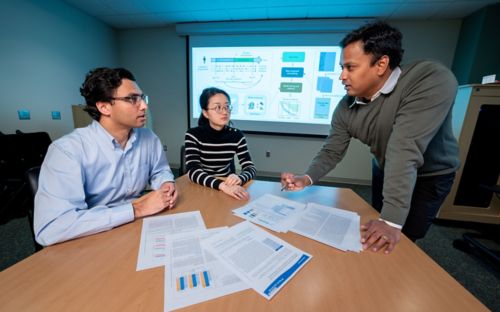A toolkit for guiding your family through uncertainty

After a family’s adjustment to a pediatric brain tumor diagnosis, they have the toolkit to cope with the uncertainty of COVID-19.
Guiding your family through times of uncertainty can be challenging. The good news is, that as a parent of a child diagnosed with cancer, you’ve already developed a toolkit for coping – use it to keep your family safe and healthy.
My colleague Tara Brinkman, PhD, of the St. Jude Department of Epidemiology and Cancer Control, and I have spent years working with families facing pediatric brain tumor diagnoses. We have the honor of walking with these families as they adjust and learn to cope with the anxiety and uncertainty that comes with a life-threatening illness.
We recently participated in an online town hall organized by the Pediatric Brain Tumor Foundation for parents of children with brain tumors. We talked about the anxiety surrounding COVID-19 and how parents of children diagnosed with brain tumors are no strangers to this kind of worry and uncertainty.
One parent described her family’s life during the pandemic as their “new-new normal.” They have already adjusted to the brain tumor diagnosis and are now adjusting again. Whether COVID-19 is your new normal or new-new normal, here are some tips to help you and your family cope with uncertainty.
Who’s in charge here?
Cancer, much like a pandemic, can be scary and can create a number of worries. You may worry about health, school, work, canceled activities, finances or the future, much of which you don’t have any control over. But you can control your behavior and, to a great extent, your thoughts.
One important thing you can control is how you take care of yourself. Make your health a priority. Good physical health is associated with good mental health. Parents, by prioritizing your health, you’re ensuring that you can be your best self for your families. We encourage patients and families to focus on the five pillars of health:
- Sleep. Get enough quality sleep to maintain physical, emotional and cognitive health.
- Nutrition. Eat healthy foods. Try to limit sugar and alcohol intake.
- Exercise. Manage stress and boost your mood with regular physical activity.
- Social support. Call your friends and family and rely on those contacts for support.
- Completing daily activities. Make a list of to-dos and mark them off. Schedule activities, including leisure time. Maintain a routine.
Having worries and anxiety during this time is normal. Keeping up with regular activities and maintaining routines and schedules are important because they are reassuring and help us, and our children, know what to expect. Schedule healthy behaviors such as meals, sleep and exercise. Add social activities, like phone conversations and online meetings through Zoom or another app, to your routine. Make sure to include leisure activities like reading, watching movies, art projects or other hobbies.
If you find yourself worrying throughout the day, consider scheduling worry time. Setting aside 3 to 5 minutes to worry can help your anxiety seem more manageable and make it easier to put unwanted thoughts aside so you can focus on being productive and present. Also, remember to be intentional about recognizing things you are grateful for each day, no matter how small they may seem. Expressing gratitude can reduce stress and increase feelings of optimism and hope.
Take five
We all get overwhelmed sometimes. It’s easy to feel yourself starting to unravel when your mind is racing with worries. We suggest practicing mindfulness exercises to bring your thoughts back to a place where you know you can cope. You can use these exercises anywhere, anytime.
One option is a grounding exercise. This activity engages our senses to ground us in the present.
Notice in your environment right now:
- Five things you see
- Four things you feel
- Three things you hear
- Two things you smell
- One good thing about yourself
Another option is a deep breathing exercise. Take slow breaths in a 3-2-4 pattern:
- Inhale deeply and slowly through your nose as you count to three.
- Pause, holding your breath for a count of two.
- Exhale completely through your mouth, making a “whoosh” sound, as you count to four.
Just like anything else you do, the more you practice these mindfulness exercises, the more skilled you will become. This practice can become a part of your daily routine. You can even engage your family in this practice.
When the worry is real
What if the worry is legitimate? As psychologists, one of the things we find particularly challenging is when people express reasonable fears. If someone is bothered about something that won’t happen, we can challenge it, or help them think about it in a different way. But when someone is concerned about something that could happen, we don’t want to overlook that. It’s important to keep lines of communication open and to create a safe space for family members to talk about their feelings.
Safety during the COVID-19 pandemic is a legitimate worry, which is why we stay home, social distance, and wear masks when we must go out. Be informed and follow the guidelines. Take comfort knowing that you and your family are taking measures to protect yourself and others.
Feeling stronger every day
Life is difficult now, but we’re all resilient. We will recover, and we will come out stronger.
Similar to cancer, not everything about the pandemic experience is bad. That is, good things can come out of this challenging time. Families grow closer. Priorities change. Stress, sadness, grief and difficulties can co-coexist with resilience and growth.
But if coping remains difficult, you may need additional emotional and psychological support. Many mental health providers are offering telehealth options — providing counseling over video apps like Zoom - so you don’t have to leave home. Sometimes, a recommendation from a primary care provider is helpful.
Working with children who have life-threatening conditions and their families, we have seen how they use and benefit from these tools. We were grateful to be able to share that experience with the Pediatric Brain Tumor Foundation, and hope you were able to take something from it as well.
Tara Brinkman contributed to this blog post.






